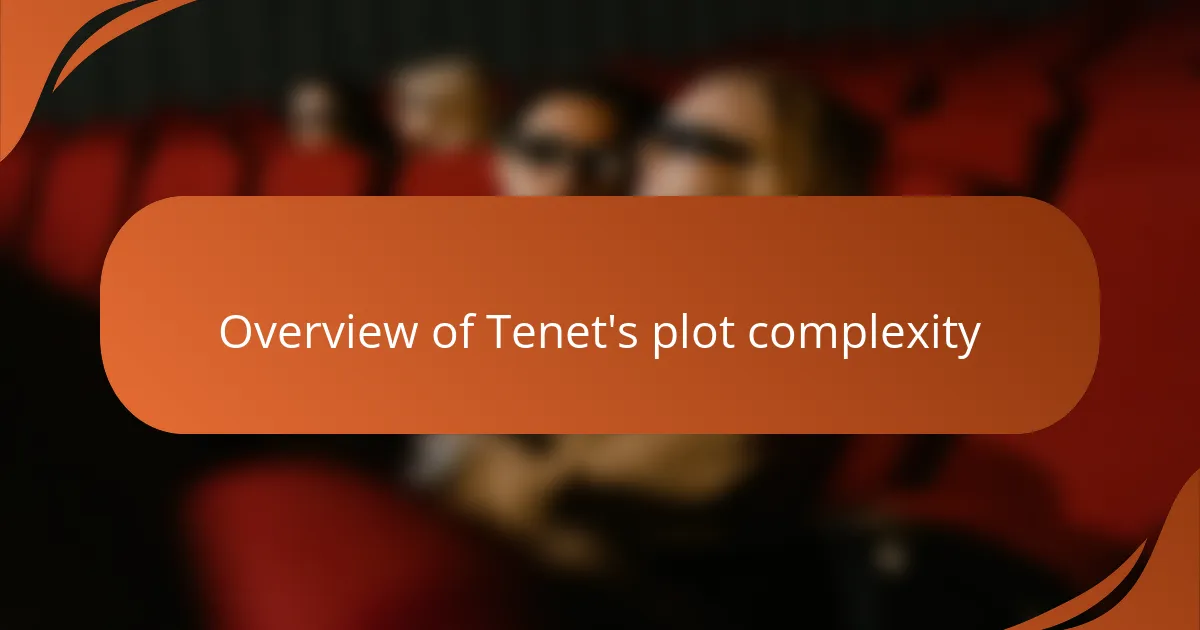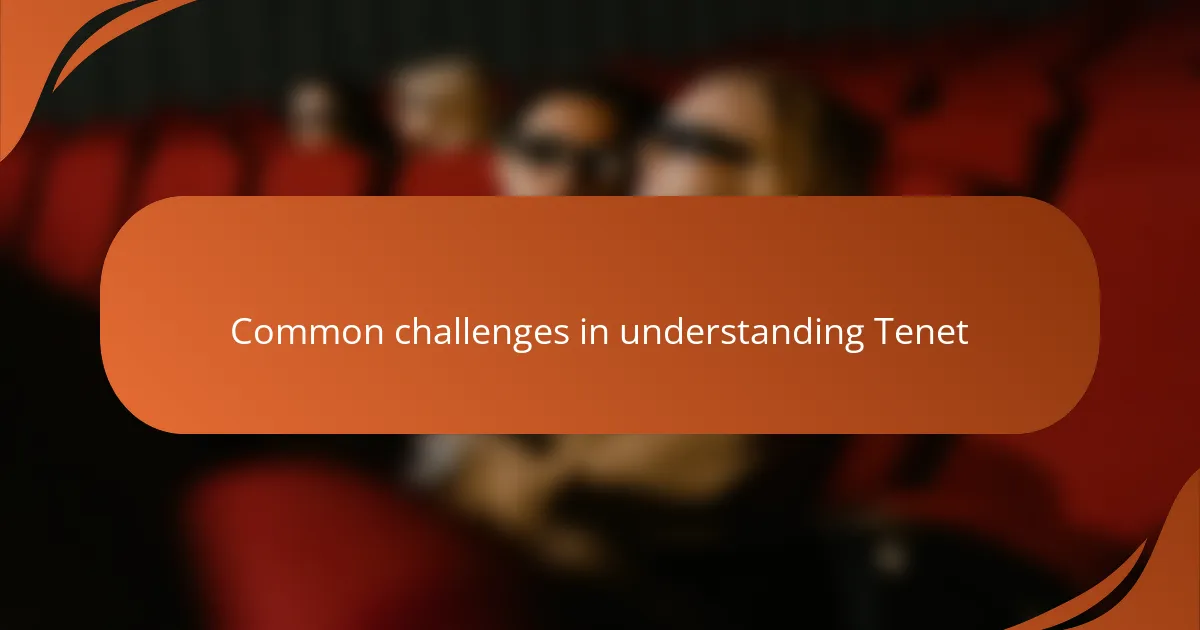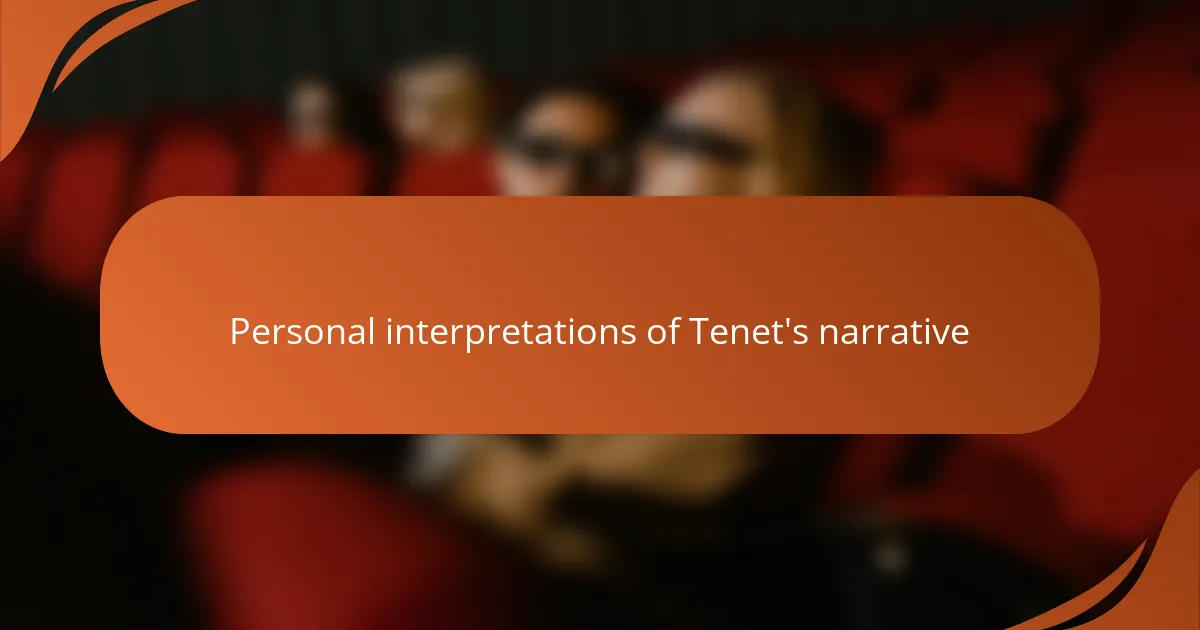Key takeaways
- Tenet presents a complex narrative with time inversion, encouraging active engagement and mental focus from viewers.
- The film’s intricacy invites discussions and multiple viewings, emphasizing that understanding can evolve over time.
- Challenges arise from tracking inverted time sequences and rapid dialogue filled with jargon, creating a unique puzzle-like experience.
- Patience and collaboration enhance appreciation for complex storytelling, transforming confusion into a collective adventure.

Introduction to Tenet movie
Tenet, directed by Christopher Nolan, is a film that instantly grabbed my attention with its bold premise centered on time inversion. From the moment I started watching, I sensed that this was not going to be an ordinary spy thriller. Have you ever felt like a movie challenges your brain in a way that borders on frustration and fascination simultaneously? That’s exactly how Tenet made me feel.
What struck me most was how Nolan weaves a complex narrative that demands active engagement rather than passive viewing. I found myself rewinding scenes and questioning events, trying to piece together the puzzle of cause and effect turned upside down. It’s rare for a film to pull you into such a mental workout, making it an experience as much about understanding as about entertainment.
Watching Tenet, I couldn’t help but admire the ambition behind its storytelling, even when the plot’s complexity seemed overwhelming. The blend of high-stakes action with intricate concepts left me wondering: how far can a film push the boundaries of conventional storytelling without losing its audience? For me, Tenet walks that fine line, inviting a deeper dive into Nolan’s labyrinth of time.

Overview of Tenet’s plot complexity
What I found most challenging about Tenet’s plot complexity is how it flips the concept of time on its head. Scenes play out not just forwards, but backwards, forcing me to constantly re-evaluate what I thought I understood. It’s like trying to solve a puzzle where the pieces keep moving—and sometimes, that felt both exhilarating and downright confusing.
At times, I caught myself pausing, rewinding, and even discussing plot points with friends just to make sense of the narrative. Have you ever been so wrapped up in decoding a story that it almost becomes its own adventure? For me, Tenet’s complexity sparked that kind of curiosity, making the film linger in my thoughts long after the credits rolled.
Yet, despite the mental gymnastics, I appreciated how this intricate storytelling invites viewers to engage actively rather than passively consuming the action. It made me wonder: is this level of complexity a new frontier in cinema, or does it risk alienating those who prefer a straightforward plot? Personally, I admire Nolan’s boldness in trusting the audience’s intellect, even if it meant embracing a certain degree of confusion.

Common challenges in understanding Tenet
One of the biggest hurdles I encountered with Tenet was keeping track of the inverted time sequences. At times, I felt like I was watching two movies at once—one moving forward and the other backward—and trying to piece them together felt like solving a riddle with missing clues. Have you ever found yourself completely engrossed yet utterly puzzled by a film? That was me, caught in constant attempts to follow the flow without losing the thread.
Another common challenge is understanding how characters’ actions influence events both forwards and backwards. It’s not just a matter of “what happened,” but “when” and “how” in a temporal sense that defies our usual logic. I remember pausing during a pivotal scene, thinking, “Wait, how did that happen before it happened?” This constant mental loop demanded a kind of attention I wasn’t used to on a movie night.
Finally, the rapid-fire dialogue packed with jargon and cryptic references added another layer of complexity. Sometimes, I felt the movie was speaking a different language—one where every sentence carried double meanings hinged on time inversion concepts. It made me wonder whether Nolan intended for us to fully grasp everything in one sitting, or if the confusion was part of the experience itself. Personally, I found that embracing the uncertainty made the film all the more intriguing.

Critical analysis from BBC UK reviews
BBC UK’s critical take on Tenet really echoed some of my own feelings about the film’s complexity. They praised Nolan’s ambition but weren’t shy about pointing out how the intricate narrative can become a barrier for viewers. It made me think—how often do we expect films to challenge us mentally without risking confusion?
What struck me in their review was the discussion around the film’s pacing and information density. BBC UK highlighted moments where the rapid unfolding of events left even seasoned viewers scrambling for clarity. I remember feeling that same rush and wondering if the movie’s brain-teaser quality overshadowed its emotional core at times.
They also raised an interesting question: does Tenet’s complexity serve the story, or does it turn into a gimmick? Reading that made me reflect on my own experience—did the confusing temporal layers deepen my engagement, or did they create a barrier I couldn’t fully cross? For me, that tension is what makes the film unforgettable, even if it’s sometimes maddening.

Personal interpretations of Tenet’s narrative
Trying to untangle Tenet’s narrative felt like chasing my own shadow—just when I thought I grasped a scene, time flipped it on its head, forcing me to reassess everything. Have you ever watched something that seemed to rewind your understanding as much as its storyline rewinds the characters’ actions? That constant mental recalibration kept me both engaged and slightly dizzy, but in a way that made the viewing experience uniquely satisfying.
What fascinated me most was how the story’s structure mirrors a puzzle with pieces that fit only when viewed from multiple angles. It wasn’t just about following what happened, but interpreting why events unfolded differently when time moved backward. I found myself reflecting on how this approach challenges our usual perception of cause and effect—does reversing time really change the meaning of choice and consequence, or just our perspective of them?
Sometimes I wondered if anyone could fully decode all the layers on a first watch, or if Nolan intended for us to live with ambiguity. There’s something almost poetic in that uncertainty, inviting me to revisit the film and discover new details each time. In a way, Tenet’s narrative complexity is less about solving a mystery outright and more about embracing the thrill of not having all the answers at once.

Lessons learned from watching Tenet
One lesson I took away from watching Tenet is that movies can demand a different kind of patience—one where you accept confusion as part of the journey. Have you ever felt yourself getting frustrated yet still eager to push forward? That tension between confusion and curiosity kept me glued to the screen, reminding me that cinema can be both challenging and rewarding.
I also learned that complex storytelling doesn’t have to be immediately clear to be effective. Sometimes, the most intriguing films are those that linger in your mind long after you’ve seen them, inviting multiple viewings and discussions. It made me realize how much I value movies that respect my intelligence and curiosity, even if it means embracing ambiguity rather than neat explanations.
Finally, Tenet taught me that engaging deeply with a film’s puzzles can be a shared experience. Talking through the plot with friends helped me unlock new perspectives, proving that complexity can foster connection rather than isolation. Have you ever found that puzzling over something together makes it more meaningful? That’s exactly what happened here, turning a tricky watch into a collective adventure.

Tips for appreciating complex films like Tenet
When approaching complex films like Tenet, I’ve found that patience is key. Instead of expecting to grasp every detail on the first watch, I remind myself that confusion is part of the experience—almost like a mental workout. Have you ever gone through a rough puzzle only to feel more satisfied when the pieces finally click? That’s how embracing uncertainty made me appreciate the film’s intricacy rather than resist it.
Another helpful tip is to engage actively with the movie, whether that means pausing to rewind tricky scenes or discussing plot points with friends. I caught myself rewinding moments multiple times, not out of frustration, but curiosity to understand how events fit together. Sharing theories afterward made the experience richer, turning a solitary viewing into a lively conversation. Doesn’t collaboration make complex stories feel less daunting?
Lastly, I think giving yourself space to revisit the film is crucial. I didn’t get everything right away, but returning to Tenet with fresh eyes revealed details I had missed—little clues that deepen the story. Have you noticed how some movies grow on you over time, revealing more with each viewing? That slow unraveling became part of the fun, reminding me that complexity doesn’t have to mean confusion forever.